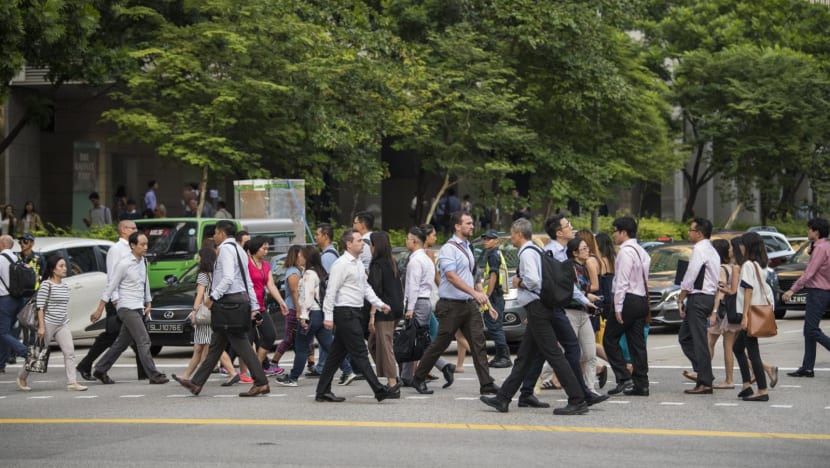Commentary: Singapore must apply its characteristic prudence to AI investment
Global productivity has not accelerated significantly despite billions of dollars in automation spending, says NUS Business SchoolŌĆÖs Sumit Agarwal.

Office workers walking on the streets of the Central Business District. (File photo: iStock/3yephotography)

This audio is generated by an AI tool.
SINGAPORE: When Nvidia released an outstanding third-quarter earnings report last Wednesday (Nov 19), CEO Jensen Huang took the chance to address fears about overvalued AI stocks.
ŌĆ£ThereŌĆÖs been a lot of talk about an AI bubble. From our vantage point, we see something very different,ŌĆØ Mr Huang said. He described how much Nvidia chips are sought after, citing that the company has US$500 billion in bookings for advanced chips through 2026.
AI is the hottest asset class of the decade. From Silicon Valley to Seoul, investors are pouring billions into anything labelled ŌĆ£AI-poweredŌĆØ. JPMorgan estimates that just 30 AI stocks account for over 40 per cent of the value of the S&P 500.
Chipmakers, data centre operators and startups that promise to redefine everything are commanding valuations that defy reason. Central banks such as the Monetary Authority of Singapore and the Bank of England have warned investors about the risk of sharp market corrections.
The narrative is irresistible: AI will transform every sector, from healthcare and finance to education and logistics, and no country or company can afford to miss out. But as history shows, when technology turns into theology, reason tends to take a backseat.
ECHOES OF TULIPS, RAILWAYS AND REAL ESTATE
In the 1630s, tulip bulbs in the Netherlands were so prized that a single flower could buy a canal-side house. When the market collapsed, fortunes vanished overnight, leaving behind one of the most famous lessons in speculative euphoria.
The human impulse to chase novelty and outsized returns has repeated itself through history, from the railway mania of the 1800s to the subprime mortgage crisis that led to the 2008 global recession.
Bubbles are rarely built on worthless ideas. Tulips are beautiful, railways were revolutionary, and housing is essential. What collapses is not the idea, but the illusion that value can only go one way.
Singapore sits at the centre of the AI gold rush. Its sovereign funds are major investors in AI-linked companies. It recently announced it will build its largest green data centre park on Jurong Island. The ambition to make Singapore an AI hub is visionary, but it comes with risks of over-investment, inefficiency and exposure to global volatility.
If global AI valuations correct sharply, the tremors could reach our financial markets and sovereign portfolios. SingaporeŌĆÖs success has always rested on anticipating cycles, not chasing them. This moment demands the same prudence.
THE PRODUCTIVITY PARADOX
For all the talk of AI-driven productivity, hard evidence remains thin. Global productivity has not accelerated significantly despite billions of dollars in automation spending. According to OECD, labour productivity growth has been weak since generative AI tools became publicly available in 2022, hovering at 0.4 per cent across OECD economies excluding T├╝rkiye in 2024.
Much of what AI delivers so far is substitution, not transformation ŌĆō replacing routine human tasks rather than amplifying human potential.
Consider customer service bots that frustrate users and escalate complex issues back to humans, doubling workloads rather than halving them. Or schools where students use ChatGPT to draft essays, only for teachers to spend twice as long verifying authenticity. Even warehouse robots require teams of technicians for oversight and maintenance.
As MIT economist David Autor notes, new technologies often reshape jobs rather than eliminate them. AI excels at prediction, but humans remain indispensable for judgment, empathy and context. Used wisely, AI can complement human capability; used rashly, it merely shifts work around without creating real productivity.
SUSTAINABILITY, THE MIRROR IMAGE OF AI
There is another global phenomenon unfolding in parallel ŌĆō the pursuit of sustainability. It is the mirror image of the AI story.
Sustainability is slow-paced and often under-rewarded in markets. The benefits of cleaner air, resource resilience and intergenerational fairness unfold over decades, not quarters. Unlike the AI boom, sustainability struggles not from excess hype but from insufficient urgency.
The true challenge is to channel the ingenuity of AI toward sustainable outcomes rather than speculative ones. Imagine using AI to optimise urban cooling systems, predict flooding or monitor energy efficiency across housing estates. These are not headline-grabbing moonshots, but quietly transformative uses of technology that create genuine public value.
If the AI bubble channels capital into sustainable innovations, it may yet prove a blessing. But if it inflates valuations detached from environmental or social outcomes, it will repeat the mistakes of past market meltdowns.
A CALL FOR RATIONAL EXUBERANCE
SingaporeŌĆÖs enduring advantage has always been its discipline ŌĆō prudent regulation, long-term planning and willingness to temper excitement with evidence.
For policymakers, that means prioritising sustainability and linking AI infrastructure to tangible productivity outcomes. For investors, it means valuing companies based on real, not hypothetical cash flows. And for firms and universities, it means embracing AI as a tool to advance sustainable growth, not merely as a badge of publicity.
AI will reshape the world, but hype must not outpace humility. As the Dutch discovered long ago, even the most beautiful tulip cannot bloom forever. The wisdom lies not in rejecting new flowers ŌĆō but in knowing when their price, or their promise, has grown too bright to last.
Sumit Agarwal is the Low Tuck Kwong Distinguished Professor of Finance, Economics and Real Estate at the National University of Singapore (NUS) Business School, and the managing director of the Sustainable and Green Finance Institute at NUS. The opinions expressed are those of the writer and do not represent the views and opinions of NUS.














